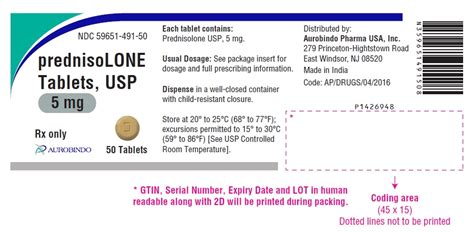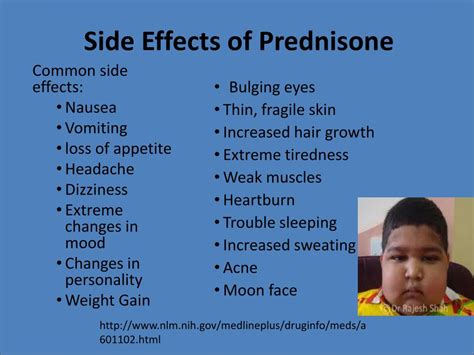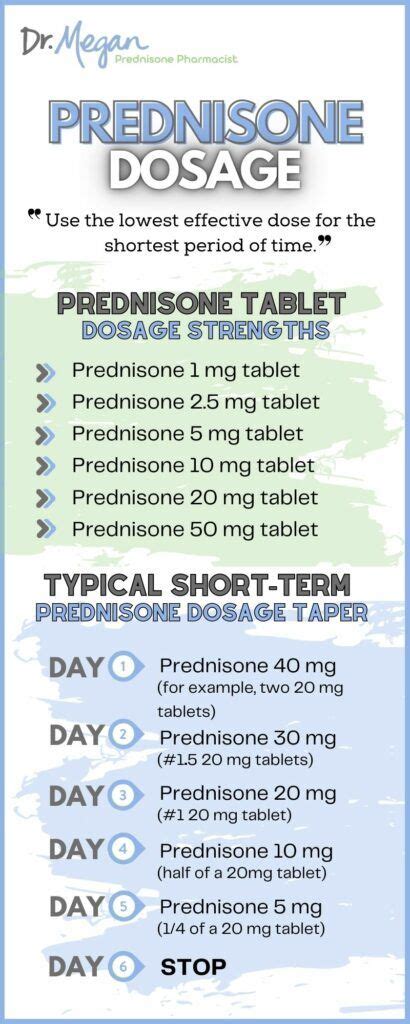Intro
Discover what prednisone does, a steroid medication that reduces inflammation, suppresses immune system, and treats various conditions like asthma, arthritis, and allergies, with effects on hormone regulation and disease management.
Prednisone is a synthetic corticosteroid that is widely used to treat various medical conditions. It is a man-made version of the naturally occurring steroid hormone cortisol, which is produced by the adrenal gland. Prednisone is prescribed to patients who have low levels of cortisol or other steroid hormones, or to treat conditions that are caused by inflammation or an overactive immune system. The medication works by mimicking the effects of cortisol in the body, reducing inflammation and suppressing the immune system.
Prednisone is used to treat a wide range of medical conditions, including asthma, rheumatoid arthritis, lupus, and certain types of cancer. It is also used to treat allergic reactions, such as hives and itching, and to reduce inflammation in the body. The medication can be taken orally or intravenously, and it is usually prescribed for a short period of time, typically several days or weeks. However, in some cases, patients may need to take prednisone for longer periods of time, such as several months or even years.
The effects of prednisone can be significant, and the medication can have a major impact on a patient's quality of life. For example, patients with asthma may experience a significant reduction in symptoms, such as wheezing and shortness of breath, after taking prednisone. Similarly, patients with rheumatoid arthritis may experience a reduction in joint pain and inflammation, allowing them to move more easily and perform daily activities with greater ease. However, prednisone can also have side effects, such as weight gain, mood changes, and insomnia, which can be unpleasant and may require additional treatment.
How Prednisone Works

Prednisone works by binding to specific receptors in the body, which triggers a response that reduces inflammation and suppresses the immune system. The medication is absorbed into the bloodstream and then distributed to various tissues and organs, where it exerts its effects. Prednisone can affect many different systems in the body, including the immune system, the endocrine system, and the nervous system. It can also affect the body's metabolism, leading to changes in weight, blood sugar levels, and other physiological processes.
The exact mechanism of action of prednisone is complex and involves multiple pathways and cellular processes. However, the overall effect of the medication is to reduce inflammation and suppress the immune system, which can help to alleviate symptoms and improve quality of life for patients with various medical conditions. Prednisone can also be used to prevent inflammation and immune system activation in patients who are at risk of developing certain conditions, such as organ transplant rejection or autoimmune disorders.
Benefits of Prednisone
The benefits of prednisone are numerous and can be significant for patients with various medical conditions. Some of the key benefits of prednisone include: * Reduced inflammation and immune system activation * Improved symptoms and quality of life for patients with asthma, rheumatoid arthritis, and other conditions * Prevention of inflammation and immune system activation in patients who are at risk of developing certain conditions * Ability to be taken orally or intravenously, making it a convenient treatment option * Availability in various formulations, including tablets, capsules, and solutionsPrednisone Side Effects

While prednisone can be an effective treatment for various medical conditions, it can also have side effects. Some common side effects of prednisone include:
- Weight gain
- Mood changes, such as anxiety or depression
- Insomnia
- Increased appetite
- Water retention
- Changes in skin appearance, such as thinning or bruising
- Increased risk of infections, such as pneumonia or tuberculosis
In rare cases, prednisone can cause more serious side effects, such as:
- Adrenal insufficiency, which can occur when the body becomes dependent on prednisone and is unable to produce enough cortisol on its own
- Osteoporosis, which can occur when prednisone causes changes in bone metabolism
- Cataracts, which can occur when prednisone causes changes in the eyes
- Glaucoma, which can occur when prednisone causes changes in the eyes
Managing Prednisone Side Effects
While prednisone can have side effects, there are steps that patients can take to manage them. Some tips for managing prednisone side effects include: * Taking the medication as directed by a healthcare provider * Monitoring weight and adjusting diet and exercise as needed * Practicing stress-reducing techniques, such as meditation or deep breathing * Getting enough sleep and establishing a regular sleep routine * Staying hydrated and avoiding excessive sodium intake * Avoiding close contact with people who are sick, to reduce the risk of infectionPrednisone Dosage and Administration

The dosage and administration of prednisone can vary depending on the medical condition being treated and the individual patient's needs. In general, prednisone is taken orally, and the dosage is typically tapered over time to minimize side effects. The medication can be taken with or without food, but it is usually recommended to take it with food to reduce stomach upset.
The typical dosage of prednisone for adults is 5-60 mg per day, taken in divided doses. The medication is usually started at a high dose and then tapered down to a lower dose over time. For example, a patient with asthma may be started on 40 mg per day of prednisone, and then tapered down to 10 mg per day over the course of several weeks.
Prednisone Interactions
Prednisone can interact with other medications, including: * Blood thinners, such as warfarin * Diabetes medications, such as metformin * Blood pressure medications, such as lisinopril * Antidepressants, such as sertraline * Anti-seizure medications, such as phenytoinPatients who are taking prednisone should inform their healthcare provider about all medications they are taking, including over-the-counter medications and supplements. This can help to minimize the risk of interactions and ensure safe and effective treatment.
Prednisone and Pregnancy

Prednisone can be used during pregnancy, but it is usually recommended that women take the lowest effective dose for the shortest possible time. This can help to minimize the risk of side effects and ensure the health and well-being of the mother and baby.
Women who are pregnant or breastfeeding should inform their healthcare provider before taking prednisone. The medication can pass into breast milk, and high doses can affect the baby's growth and development. However, in some cases, the benefits of prednisone may outweigh the risks, and women may be able to take the medication while pregnant or breastfeeding.
Prednisone and Breastfeeding
Prednisone can pass into breast milk, and high doses can affect the baby's growth and development. However, the medication is usually considered safe for use during breastfeeding, as long as the mother is taking a low dose.Women who are breastfeeding and taking prednisone should monitor their baby's growth and development closely, and inform their healthcare provider if they notice any changes or concerns. The medication can also affect the mother's milk supply, and women may need to adjust their breastfeeding schedule or supplement with formula to ensure the baby is getting enough nutrition.
Prednisone Alternatives

While prednisone can be an effective treatment for various medical conditions, there are alternative medications and therapies that may be used instead. Some alternatives to prednisone include:
- Other corticosteroids, such as hydrocortisone or dexamethasone
- Immunosuppressants, such as cyclosporine or tacrolimus
- Biologics, such as adalimumab or etanercept
- Non-steroidal anti-inflammatory drugs (NSAIDs), such as ibuprofen or naproxen
- Alternative therapies, such as acupuncture or massage
The choice of alternative medication or therapy will depend on the individual patient's needs and medical condition. Patients should discuss their options with their healthcare provider to determine the best course of treatment.
Prednisone and Other Medical Conditions
Prednisone can be used to treat a wide range of medical conditions, including: * Asthma * Rheumatoid arthritis * Lupus * Certain types of cancer * Allergic reactions * Inflammatory bowel disease * Multiple sclerosis * PsoriasisThe medication can also be used to prevent inflammation and immune system activation in patients who are at risk of developing certain conditions, such as organ transplant rejection or autoimmune disorders.
What is prednisone used for?
+Prednisone is used to treat a wide range of medical conditions, including asthma, rheumatoid arthritis, lupus, and certain types of cancer.
How does prednisone work?
+Prednisone works by binding to specific receptors in the body, which triggers a response that reduces inflammation and suppresses the immune system.
What are the side effects of prednisone?
+Common side effects of prednisone include weight gain, mood changes, insomnia, and increased appetite. Rare side effects can include adrenal insufficiency, osteoporosis, and cataracts.
Can I take prednisone while pregnant or breastfeeding?
+Prednisone can be used during pregnancy, but it is usually recommended that women take the lowest effective dose for the shortest possible time. The medication can pass into breast milk, and high doses can affect the baby's growth and development.
What are the alternatives to prednisone?
+Alternatives to prednisone include other corticosteroids, immunosuppressants, biologics, NSAIDs, and alternative therapies such as acupuncture or massage.
In conclusion, prednisone is a powerful medication that can be used to treat a wide range of medical conditions. While it can have side effects, the benefits of prednisone can be significant for patients who are suffering from inflammation and immune system activation. By understanding how prednisone works, its benefits and side effects, and its alternatives, patients can make informed decisions about their treatment and work with their healthcare provider to develop a personalized treatment plan. We invite you to share your thoughts and experiences with prednisone in the comments below, and to share this article with anyone who may be interested in learning more about this important medication.
